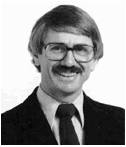Thomas E. Kurtz
Born February 22, 1928, Oak Park, Ill.; with John Kemeny, developer of the programming language and system BASIC.

Education: BA, Knox College, 1950; PhD, mathematics/statistics, Princeton University, 1956.
Professional Experience: Dartmouth College: instructor, mathematics, 1956-1958, assistant professor, 1958-1963, associate professor, 1963-1966; professor, 1966-1993, director, Computing Center, 1959-1975, director, Kiewit Computation Center, 1966-1975, director, Office of Academic Computing, 1975-1978, vice chair and chair, Program in Computing and Information Science, 1979-1988; member, Pierce Panel, President's Science Advisory Council in Higher Education, 1965-1967; chairman, Council, EDUCOM, 1973-1974.
Honors and Awards: AFIPS Pioneer Award, 1974; DSc (Hon.), Knox College, 1987; IEEE Computer Science Pioneer Award, 1991.
Kurtz received his PhD in statistics from Princeton in 1956, his first contact with computing having occurred in 1951 at the summer session of the Institute for Numerical Analysis (INA) at UCLA in the summer of 1951. He joined the Dartmouth College Mathematics Department (chaired by John G. Kemeny) in 1956 as an instructor. Besides teaching statistics and numerical analysis, he served as the Dartmouth contact to the New England Regional Computer Center (NERComP), which was supported in part by IBM at MIT. In 1959 Dartmouth obtained an LGP-30 computer, and Kurtz became the first director of Dartmouth's computing center.
Around 1962, Kurtz and John G. Kemeny began jointly to supervise the design and development of a time-sharing system for university use. The idea to use time-sharing to reach all Dartmouth students came from John McCarthy who, around 1961, advised, "you guys ought to do time-sharing." This effort culminated in 1964 in the first Dartmouth Time-Sharing System (DTSS). Although other languages such as Fortran and Algol were provided, the principal language was BASIC, which was deliberately designed to be easy to learn and easy to use.
Subsequently, Kurtz served as the director of the Kiewit Computation Center from 1966 to 1975, and as director of the Office of Academic Computing from 1975 to 1978. In 1979 he and Stephen J. Garland organized a professional master's program in Computer and Information Systems, funded in part with a grant from IBM. Upon termination of the CIS program in 1988, Kurtz returned to teaching. He retired from Dartmouth College in 1993.
Outside of Dartmouth, Kurtz served as council chairman and trustee of EDUCOM, as trustee and chairman of NERcomP, and on the so-called Pierce Panel of the President's Advisory Committee. He also served on the steering committee for two NSF- and ARPA-supported activities, and was the chair of the first CCUC conference on instructional computing. He helped form the American National Standards committee X3J2, which developed the ANSI standard for BASIC, serving as chair from 1974 to 1985, and as secretary from 1990 to the present. He is a member of the ISO committee SC22/WG8, concerned with the international standard for BASIC, and served as its convener from 1987 to 1993.
In 1983, he joined John Kemeny and three former Dartmouth students in forming True BASIC, Inc., whose purpose was to develop quality educational software and a platform-independent BASIC compiler based on the ANSI standard. He continues to be associated with this company, and serves as its secretary/ treasurer.
QUOTATION
"If Fortran is the lingua franca, then certainly it must be true that BASIC is the lingua playpen."
BIBLIOGRAPHY
Biographical
Kemeny, John G., and Thomas E. Kurtz, Back to BASIC. The History, Corruption and Future of the Language, Addison-Wesley, Reading, Mass., 1985. (Note: True BASIC Inc. is now the copyright holder and sole distributor of this book.)
Kurtz, Thomas E., "BASIC," in Wexelblat, Richard L., ed., History of Programming Languages, Academic Press, New York, 198 1, Chapter 11.
Slater, Robert, Portraits in Silicon, MIT Press, Cambridge, Mass., 1987, Chapter 22.
Significant Publications
Kurtz, Thomas E., Basic Statistics, [Kurtz notes this to be his first use of the word BASIC.] Prentice-Hall, Englewood Cliffs, NJ., 1963.
Kemeny, J.G., and T.E. Kurtz, "Dartmouth Time Sharing," Science, Vol. 162, 1968, pp. 223-228.
Kemeny, J.G., and T.E. Kurtz, BASIC Programming, John Wiley & Sons, New York, 1967, 1971, 1980.
Kemeny, J.G., and T.E. Kurtz, Structured BASIC Programming, John Wiley & Sons, New York, 1987.
UPDATES
In 1994 Kurtz was made a Fellow of the ACM (MRW, 2012). Portrait replaced (MRW, 2013)
New content Copyright © 2013-2023 by the IEEE Computer Society and the Institute of Electrical and Electronics Engineers Inc.
All rights reserved. This material may not be reproduced or redistributed without the express written permission of the copyright holder.
